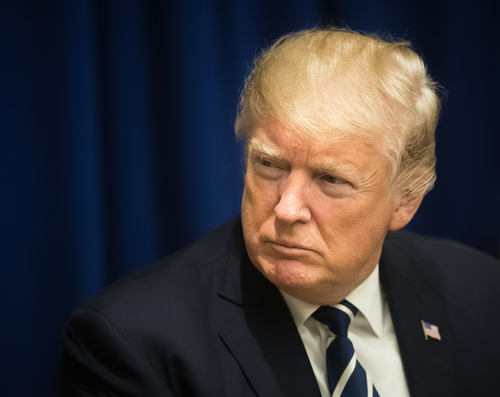Judge refuses to block subpoena for Trump's accounting records

President Donald Trump. Photo from Shutterstock.com.
A federal judge has refused to block a subpoena from the House Committee on Oversight and Reform for eight years of financial records from the accounting firm for President Donald Trump.
Trump filed a lawsuit against Rep. Elijah Cummings, D-Md., chairman of the House committee, last month.
U.S. District Judge Amit Mehta of Washington, D.C., said Congress had sufficient justification to seek the records from Mazars USA, report the New York Times, Politico, the Wall Street Journal, the Hill, the Washington Post and the National Law Journal. The decision, filed Monday, is here.
Mehta also refused to stay his ruling pending appeal.
Trump told reporters that the ruling was “ridiculous” and “totally the wrong decision by obviously an Obama-appointed judge.” Trump plans to appeal.
A lawyer for Trump had argued that Congress has no authority to seek Trump’s financial records because it wants them for a law enforcement purpose rather than for its legislative work. The lawyer for the House of Representatives had argued that the financial records are needed to learn whether the president is beholden to foreign interests and whether ethics laws must be strengthened.
Mehta said reasons cited by the House “are facially valid legislative purposes, and it is not for the court to question whether the committee’s actions are truly motivated by political considerations.”
Mehta said Congress previously has investigated Presidents Richard Nixon and Bill Clinton in connection with Watergate and the failed Whitewater land deal, and “this court is not prepared to roll back the tide of history.”
Nor is there a need for Congress to open a formal impeachment inquiry, Mehta said. “It is simply not fathomable that a Constitution that grants Congress the power to remove a president for reasons including criminal behavior would deny Congress the power to investigate him for unlawful conduct—past or present—even without formally opening an impeachment inquiry,” Mehta wrote.
Mehta issued his ruling the same day the Trump administration directed former White House counsel Don McGahn not to testify before a House congressional committee. The White House cited a May 20 legal opinion by the Department of Justice’s Office of Legal Counsel that said McGahn has immunity from compelled testimony, the Washington Post reported.
“This testimonial immunity is rooted in the constitutional separation of powers and derives from the president’s independence from Congress,” the legal opinion said.
Write a letter to the editor, share a story tip or update, or report an error.


